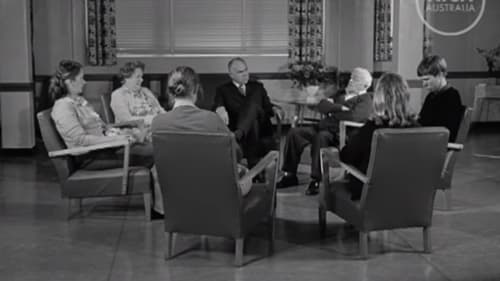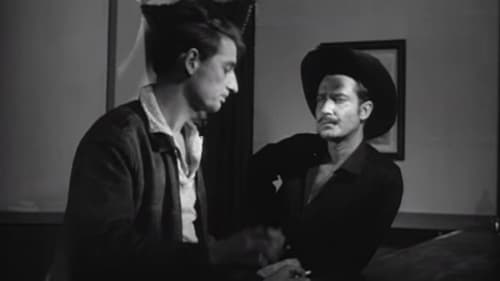
Stanley Hawes
Рождение : 1905-01-19, London, England, UK
Смерть : 1991-04-19
История
Stanley Gilbert Hawes was born in London in 1905. He spent his youth in Birmingham and worked for the city's council from 1922 to 1934. Hawes had an enthusiastic interest in cinema, co-founding the Birmingham Film Society in 1931. In the late 1930s, Hawes began producing documentary films – first at Gaumont and then at Strand Film Company. But when World War II broke out, documentary production in Britain essentially halted and Hawes found himself out of work. Fortunately, he was offered a job overseas at the newly-established National Film Board of Canada. Here, Hawes was able to produce several documentaries, focusing mainly on the Canadian war effort. In 1946, Hawes moved to Sydney to work for the Australian National Film Board (later the Commonwealth Film Unit) as the organisation's first Producer-in-Chief. Over a quarter of a decade, Hawes built up a reputation as one of Australia's most respected and acclaimed documentarians. He retired in 1970, but remained active in the Australian film community until his death in 1991.

Production Supervisor
Part 1 of the History of Australian Cinema series. Australian cinema from the very beginning, from the newsreels, ethnographic and actuality films, to the controversy of "The Story of the Kelly Gang" and the success of "The Sentimental Bloke".

Supervising Producer
Shows new methods in treating those afflicted with mental health issues. Contrasts past treatment regimes where people were locked away out of sight with the new, 1960s, psychiatric ideas of "group therapy" and talking therapy. Also shows practical behaviours aimed at returning patients to productive lives in society and outpatient services.

Supervising Producer
Shot with a big cowboy nod to the Western genre, this road safety film shows the danger of speeding on an unknown country road at night.

Production Supervisor
A panorama of scenic beauty unfolds as the newspaper delivery man works his run along Sydney's northern beaches of Newport and the Palm Beach area.

Production Supervisor
The introduction of electricity into the village of Bigga in New South Wales.

Director
Produced to celebrate the Jubilee of Federation, Cavalcade of Australia provides an historical review of the development of the nation between 1901 and 1951. The film opens with the visit of the Duke and Duchess of York (later King George V and Queen Mary) to Australia in 1901 to open the first Commonwealth Parliament. Through the use of historical footage, the film not only covers notable events in the Commonwealth story but also social development, fashions and economic growth over the period.

Supervisor of Production Resources
Beautifully filmed in black and white, this classic short film looks at pearling in the late 1940s. It goes on board the boats that work off the coast of Broome, Western Australia, from March to December each year. Crewed mainly by Aboriginal, Malay and Chinese men, they work six days a week from sun up to sun down—replenished occasionally by supply boats that also take away their hauls of pearl shell. The film captures the atmosphere, the detail and the danger involved in the search for shell as the divers in huge metal helmets and layers of clothing under their suits dive two at a time, each with one person tending their airhose and another their lifeline.

Supervisor of Production Resources
In the estuaries and lagoons of the Northern Territory, freshwater and saltwater crocodile are hunted for their hides by both Indigenous and non-Indigenous hunters. This film shows Aboriginal people using age-old hunting techniques to land crocs either for food or for skins. The methods employed by the professional hunters, who earn as much as 3000 pounds during the season, are also depicted, followed by a brief look at how the hides are skinned and prepared before being transported to the leather factories of Sydney and Melbourne.

Executive Producer
The Valley is Ours is a tribute to Australia's greatest river and the valley that it supports. Homage to post-war progress, this classic film celebrates the abundance of the Murray River Valley; from agriculture to timber, fishing to mining, fruit picking to shipbuilding. Proud and optimistic, it also celebrates the spirit of the people as they overcome problems of erosion, bushfire and drought and makes a plea for further development, arguing that at least another million people could find happy homes in this fertile territory.

Supervising Producer
Made by The National Film Board 1947. Directed by Catherine Duncan. Christmas in Australia is a mid summer festival, with temperatures rising high. Over the years many of the traditional northern hemisphere Christmas customs have been modified to fit the climate. Cool drinks have taken the place of hot refreshments and much time is spent out of doors but the spirit of Christmas is unchanged and Santa Clause still arrives with snow glistening in his beard!

Producer
Made by The National Film Board 1947. Directed by Catherine Duncan. Christmas in Australia is a mid summer festival, with temperatures rising high. Over the years many of the traditional northern hemisphere Christmas customs have been modified to fit the climate. Cool drinks have taken the place of hot refreshments and much time is spent out of doors but the spirit of Christmas is unchanged and Santa Clause still arrives with snow glistening in his beard!

Producer
In Australia, children live in the Outback, too far from others to travel to any school. The Australian government has a school with no student only teachers that correspond with their pupils and teach those children at their own pace.

Director
In Australia, children live in the Outback, too far from others to travel to any school. The Australian government has a school with no student only teachers that correspond with their pupils and teach those children at their own pace.

Director
This short documentary from the Canada Carries On series celebrates the contribution of Canada’s railroads to the war effort. The film includes a sequence from Buster Keaton's 1926 silent comedy The General, as well as a re-enactment of Lord Strathcona driving the final spike into the Canadian Pacific Railway Line.

Director
This film illustrates the difference between World War II and the war of 1914, emphasizing the importance of mechanization, and contrasting the mobile tactics with the immobility of trench warfare. The scientific approach, both to problems of military strategy and to new weapons, is all-important. The film shows some of the work done by Canadian scientists to make these weapons as effective as possible.

Director
A narrated examination of old-fashioned maple sugar production in the St. Lawrence Valley. Footage shows local farmers tapping trees and gathering sap in the sugar bush; sleds being pulled variously by dog, horse, and ox; the boiling of sap in cauldrons and the casting of sugar in wooden molds; and a sugaring-off party at which local youths gather to taste the first maple sugar of the season.

Director
A WWII film about children evacuated from Britain and sent to Canada for their safety. The film begins in England with children seeking shelter as anti-aircraft guns roar outside. On their arrival in Canada, they are thrilled by the brightly lit cities, powerful Canadian trains, hot dogs and ice cream. They find, too, that instead of becoming Mounties or cowboys, they have to go to school. The closing sequence shows them learning to ski and skate and preparing for Christmas in their new homes.

Director
This short documentary is part of the Canada Carries On series of morale-boosting wartime propaganda films. In Home Front, the various WWII-era social contributions of women are highlighted. From medicine to industrial labour to hospitality, education and domesticity, the service these women provided to their country is lauded.

Director
Not by any means a truly comprehensive scientific study, this film nevertheless conveys in a popular fashion facts as to the development and habits of various types of apes. Skillful direction and interesting commentary almost succeed in transforming the film into an “entertainment” piece.

Director
Here is the Land: A film of land settlement for the unemployed. Filmed in 1937.




